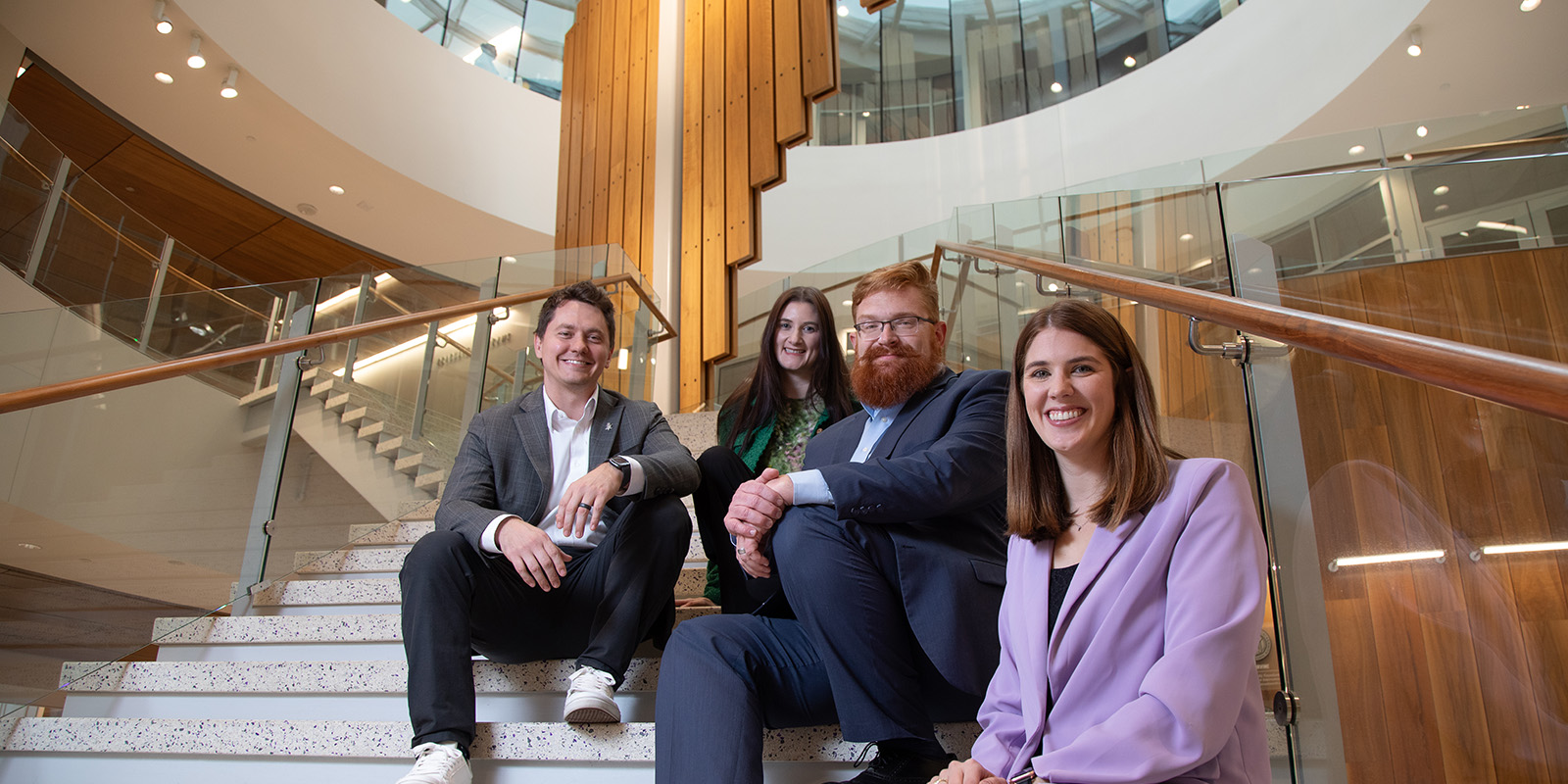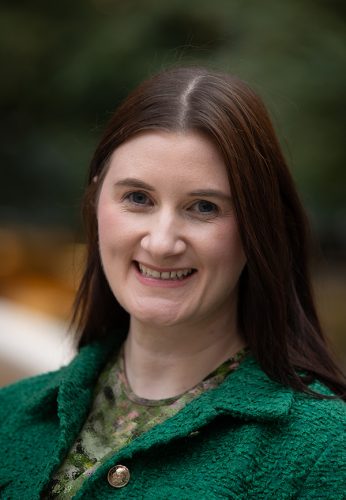
From left: Entrepreneurship faculty Devin Burnell, Stella Seyb, Thomas Allison and Emily Neubert are researching the role that empathy and sincerity play in entrepreneurial ventures.
Startups with a Story
TCU business faculty are shaping entrepreneurship by showing how values and authentic storytelling help new ventures draw investors.
AS A HIGH SCHOOLER, DAVID MINOR started a lawn mowing business. He kept with it as an undergraduate student majoring in business administration at TCU.
Before he graduated, Minor said, he had three crews operating with eight employees. “I thought, you know what, I’m just going to keep doing this,” he said.
Minor spent 18 years scaling up the business. By 1998, Minor’s Landscape Services had expanded to three offices in Dallas-Fort Worth, employing roughly 300 en route to becoming one of the area’s largest commercial landscape service companies.
Central to the business’s success, Minor said, was the constant setting and monitoring of company goals. Building what he calls a world-class culture was another key. “We created an environment where everybody felt appreciated, felt loved, where people would want to run through walls for their colleagues,” he said.

“Forty years ago or so, an authoritarian type of leadership style was the norm,” David Minor said. “If that’s what you’re relying on in today’s day and age, with the young workforce that we have … you’re way behind.”
He eventually sold the business to Fortune 500 company ServiceMaster Inc.
Minor transitioned into higher education in 2000, joining the TCU Neeley School of Business as the William M. Dickey Entrepreneur in Residence and the founding director of what is now the TCU Institute for Entrepreneurship and Innovation.
He said he is proud of the institute’s mission to teach students the importance of values-led entrepreneurship, a philosophy Minor credits as central to his career.
“It means doing business the right way,” he said. “Being conscious of every decision you make and how it affects your stakeholders, which would be your customers, your employees, your colleagues, everybody that’s involved in the business … being fair, being ethical, being caring and compassionate.
“That’s important to me. And I think it’s becoming more important for young people in society.”
The larger pedagogical and research focus at Neeley reflects this emphasis on values-based business.
“It’s so infused in the fabric of TCU to care about values in your community,” said Lianne Yang, director of programming at Neeley. “This generation is already thinking about how they can support others while also supporting themselves.”
“There are a lot of people out there that aren’t authentic and aren’t empathetic that have become successful,” Minor said. “But I think that’s changing.”
THE BACKSTORY

“If you’re telling stories inauthentically, I feel like people don’t empathize with that,” Devin Burnell said. “It’s like, ‘I don’t know if I really trust that entrepreneur.’ ”
To pinpoint behaviors shared among successful entrepreneurs, Devin Burnell and Emily Neubert, assistant professors of entrepreneurship, plugged into podcasts.
The researchers constructed a theory that entrepreneurs use narratives as a critical tool to overcome limited resources. Burnell and Neubert’s team plotted patterns from the NPR podcast How I Built This, featuring journalist Guy Raz interviewing businesspeople such as billionaire Richard Branson and Spanx founder Sara Blakely about their entrepreneurial expeditions.
“We looked at those stories and just coded for the different actions they exhibited during those journeys,” Burnell said.
Drawing from the podcast stories, the team theorized that a captivating narrative highlighting entrepreneurial resourcefulness can convey competence and creativity. Such a narrative might also evoke positive responses from potential supporters, including financial backers.
They next expanded to include another business-related podcast, StartUp. The show centers on Alex Blumberg, former producer for This American Life and co-creator of Planet Money, as he launches a podcasting business after his departure from NPR.
The podcast immerses listeners in Blumberg’s efforts through audio excerpts chronicling conversations with his co-founder, interactions with stakeholders and his first business pitch to a billionaire angel investor. He eventually sold the podcast to Spotify for a reported $200 million.
Burnell, Neubert and Greg Fisher of Indiana University used StartUp’s transcript to outline storytelling strategies that entrepreneurs can deploy to grow their businesses.
“Narratives help entrepreneurs and potential venture supporters to make sense of new ventures and to frame entrepreneurial journeys,” write Burnell, Neubert and Fisher in their 2023 study published in Business Horizons.
Some of the study’s takeaways highlight the role of empathy and authenticity in entrepreneurial success. Narratives that “generate a sense of buzz and excitement” by tying a product or business to larger market trends can stir investors’ fears of missing an opportunity.
Selling a product or venture via this type of narrative also means framing investor expectations realistically. Failure to fulfill expectations may make entrepreneurs seem untrustworthy.
“There’s this pressure to tell a narrative of a future situation where your venture is killing it,” Burnell said. “And that can gain support for your venture, but that’s also being inauthentic because if you’re not being honest about what your capabilities are for fulfilling demand, then ultimately you’re going to leave a lot of people disappointed.”
EYE OF THE INVESTOR

“Entrepreneurs are the ones that are willing to act amidst that uncertainty,” Emily Neubert said. “I find it fascinating to study the psychology of entrepreneurs because they often think and act differently than others.”
Neubert’s larger body of work analyzes the decision-making process of entrepreneurs and investors.
In a 2023 study published in Entrepreneurship Theory and Practice, she and co-author Fisher examine how potential investors make decisions. They argue that people deciding whether to support a venture operate with incomplete and sometimes conflicting information.
A central question in the study is how people or organizations that help new businesses grow — from friends and family to angel investors, venture capital firms and crowdfunders — decide whether to offer resources and support.
Entrepreneurial situations, the researchers write, are riddled with ambiguity and complexity. “A lot of papers focus around uncertainty, but uncertainty is not the only type of knowledge problem,” Neubert said. “There is information out there, but you can’t discern what is important or what’s going to happen.”
Potential investors may try to analyze available information — characteristics of the entrepreneur or venture, for example — to reach an educated guess, Neubert said. “You’re trying to figure out, ‘OK, what are the important factors I need to be paying attention to that will make or break this venture?’ ”
People hearing a business pitch must make sense of environmental stimuli in the absence of certainties to reach an investment decision. Potential supporters, therefore, rely heavily on social and environmental cues.
“A lot of the time, it starts with this instinctive decision where you have this gut reaction,” Neubert said. “And that can be informed pretty quickly by what you’re seeing, the first few things [the entrepreneurs] are talking about and what the venture is representing or aiming for.”
The study suggests that seasoned investors are more inclined to trust their initial gut reactions because of their experience and knowledge. But for investors without such experience, a gut reaction tends to be based on emotion and subject to biases.
Ventures requiring greater investment entail a longer deliberation process, the study theorizes. Investors also spend more time debating the decision if they have business partners. “You’re going to have to tell others why this is a good opportunity,” Neubert said. “So you need to have solid reasoning.”
Investors must also make sense not only of the entrepreneurial venture but also the entrepreneurs themselves. Any existing relationship between the entrepreneur and a potential investor can also influence the outcome.
Potential supporters who have an emotional connection to the entrepreneur make more of an effort to vet a business endeavor, as they feel a stronger sense of obligation. Absent an existing tie, investors may be drawn to a venture if they identify with the entrepreneur.
“Personally, when I see people that seem to have the same traits that I have or had when I was a young person, I gravitate toward those people,” said Minor, who has recently founded the Greener Good, which is “believed to be the country’s first 100 percent carbon-neutral landscape company,” reports Fort Worth Magazine.
When assembling an entrepreneurial team, it can be tempting to recruit like-minded individuals, but Minor cautions against this approach. “Create a team that may not have those same characteristics,” he said. “I used to joke, ‘If we always agree with each other, one of us is not needed.’ ”
HEART ON YOUR SLEEVE
The notion of entrepreneurial authenticity applies in digital and physical realms.
Crowdfunding campaigns typically rely on online fundraising efforts that rally from a few dozen to a few hundred supporters; each contributes a small amount. These campaigns contrast with venture capitalist efforts, which involve fewer investors contributing larger amounts.
Thomas Allison, an associate professor of entrepreneurship, studies how entrepreneurial pitches perform in reality versus those shown on TV shows such as Shark Tank or Dragons’ Den.

Thomas Allison’s research suggests that potential investors respond to pitches in which entrepreneurs display a spectrum of emotions, not exclusively enthusiastic or positive ones.
“Through the media, I think we as a public have a vision of what entrepreneur pitches are,” Allison said. “And I think that’s often done a little bit to parody.
“If you’ve ever seen the TV show Silicon Valley, you’ll see the stereotypical version. It’s a very upbeat presentation. They’re very serious about the problem and then extremely enthusiastic about the solution and how they think it’s going to change the world.”
Allison’s research suggests that potential investors respond to pitches in which entrepreneurs display a spectrum of emotions and tend to lean away from pitches that feel flat.
“Crowdfunding investors respond to all sorts of different pitches,” Allison said. “It’s not necessary to always be extremely excited and passionate. In some situations, it makes sense to express anger or sadness.”
Allison co-authored a 2024 Journal of Small Business Management study with Pyayt Oo of the University of Texas at Arlington; it examines how crowdfunders pick up on perceptions of emotional authenticity.
Allison described “display authenticity” as the degree to which entrepreneurs’ nonverbal actions align with their emotions. “If it’s perceived that there’s authenticity there, then the crowd is more likely to feel empathy.”
The study provides examples of 12 campaign pitch videos launched on Kickstarter’s crowdfunding platform. Coders rated the videos, in which people pitched everything from a fantasy coloring book to an animated feature film to a bike shop, on a scale based on their perceptions of the presenters’ emotional authenticity.
The six campaigns judged to contain high display authenticity raised a total of $589,305 compared with a mere $139 raised by the six campaigns rated with low display authenticity.
EMPATHY-DRIVEN ACTION
Stella Seyb, assistant professor of entrepreneurship and innovation, has long been interested in the negative outcomes of good intentions.
“How do we get from the point of people walking in with good intentions and then harm occurring?” Seyb said.
“THERE ARE A LOT OF PEOPLE OUT THERE THAT AREN’T AUTHENTIC AND AREN’T EMPATHETIC THAT HAVE BECOME SUCCESSFUL, BUT I THINK THAT’S CHANGING.”
David Minor
Seyb authored a related 2023 study with Dean Shepherd of the University of Notre Dame and Trenton Williams of Brigham Young University.
The work builds on the notion that empathy is a driving force behind social entrepreneurship, whereby entrepreneurs launch businesses that address social issues.
Fundamental to the study is the assumption that empathetic people can agree with target beneficiaries about what they need but arrive at different conclusions on how to go about it.
The study examines how entrepreneurs devote attention to an individual’s problems and then seek to remedy them through a business solution.

Stella Seyb’s 2023 study examines how entrepreneurs devote attention to an individual’s problems and then seek to remedy them through a business solution.
The authors posit that empathetic people can arrive at different conclusions about what their target beneficiaries need despite agreeing with how the beneficiaries feel.
The study references a 2016 paper by Seyb’s co-authors that looks at a social venture’s efforts aimed at providing food and shelter to people in Haiti in the aftermath of an earthquake. Another example comes from Seyb’s 2019 work that studied entrepreneurs working on exoskeletons to help people affected by spinal injuries to walk again.
Despite an entrepreneur’s good intentions, targeted beneficiaries didn’t always reap the end rewards.
“We’ve all had experiences where we were going through something difficult, and somebody meant well and inadvertently made things worse,” Seyb said. “So one of the important things with this work is that we’re focusing on people who genuinely mean well at the beginning.”
The group cited earlier research that indicated collaborations can be messy when target beneficiaries are included, with setbacks characteristic of the trial-and-error process to be expected. Beneficiaries express frustration “with both their own situations and the entrepreneur’s actions.”
That doesn’t necessarily make the ideation process counterproductive.
“There are psychological benefits of embracing negative emotion,” Seyb said. “There can also be benefits of having a break from confronting negative emotions and building up those psychological resources to then come back and fight the problem again the next day.”
When entrepreneurs and potential beneficiaries collaborate on solving an issue, one side might want to tackle negative emotions head on in search of a solution, while the other prefers to avoid them.
“It depends a lot on their goals and what trade-offs they’re willing to make,” Seyb said.
THE NAME OF THE GAME
Empathy and authenticity have become central to the Neeley faculty’s research focus on entrepreneurship.
“I’m excited Neeley faculty are looking into these kinds of things,” Minor said. “Because, to me, that’s what it’s all about: values and doing things the right way.”
The shift reflects the growing recognition of positive human qualities as drivers of success in real-world business practice.
“I think entrepreneurship develops your own authenticity and empathy because you’re forced to talk to a lot of people to figure out if this is actually a problem that you’re solving for,” Yang said. “To build a good pitch requires a lot of authenticity and being able to level with someone and receive feedback in a way that’s going to make your business better.”
The tides of the entrepreneurial landscape are indeed shifting.
“Forty years ago or so, an authoritarian leadership style was the norm,” Minor said. “If that’s what you’re relying on in today’s day and age with the young workforce that we have, where people are demanding honesty and transparency and inclusivity and those types of things, you’re way behind.”

Your comments are welcome
Comments
Related reading:
Research + Discovery, Sports: Riff Ram
Athletes Cash in on Names, Images or Likenesses
After NCAA changes, a TCU program helps student-athletes build a brand.
Features
Venture Capitalism 101
MBA students connect investors and startups in a Neeley program.
Alumni, Features
Andy Mitchell Snags Weinstein Film Library
The alumnus used business intuition and a winning personality to become a major player in Hollywood finance.